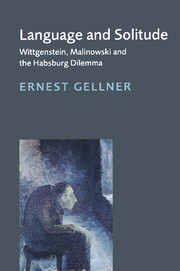Book contents
- Frontmatter
- Contents
- Preface
- Foreword
- Part I The Habsburg dilemma
- Part II Wittgenstein
- Part III Malinowski
- 23 The birth of modern social anthropology
- 24 The Malinowskian revolution
- 25 How did Malinowski get there?
- 26 Whither anthropology? Or: whither Bronislaw?
- 27 The difference between Cracow and Vienna
- 28 Malinowski's achievement and politics
- 29 Malinowski's theory of language
- 30 Malinowski's later mistake
- 31 The (un)originality of Malinowski and Wittgenstein
- Part IV Influences
- Part V Conclusions
- General bibliography
- Bibliographies of Ernest Gellner's writings on Wittgenstein, Malinowski, and nationalism
- Index
24 - The Malinowskian revolution
Published online by Cambridge University Press: 05 March 2010
- Frontmatter
- Contents
- Preface
- Foreword
- Part I The Habsburg dilemma
- Part II Wittgenstein
- Part III Malinowski
- 23 The birth of modern social anthropology
- 24 The Malinowskian revolution
- 25 How did Malinowski get there?
- 26 Whither anthropology? Or: whither Bronislaw?
- 27 The difference between Cracow and Vienna
- 28 Malinowski's achievement and politics
- 29 Malinowski's theory of language
- 30 Malinowski's later mistake
- 31 The (un)originality of Malinowski and Wittgenstein
- Part IV Influences
- Part V Conclusions
- General bibliography
- Bibliographies of Ernest Gellner's writings on Wittgenstein, Malinowski, and nationalism
- Index
Summary
Between the two wars Bronislaw Malinowski taught at the London School of Economics. He died in America during the Second World War. During his period in London he in effect created a new subject and profession, dominated it, and turned its practitioners into an astonishingly cohesive and effective guild. In the social sciences and the humanities, there can be few if any disciplines which are so homogeneous, so united in a shared intellectual and procedural paradigm, and so compact in social organisation as ‘British’ social anthropology. That this is so is, for better or worse, to a large extent the achievement of Bronislaw Malinowski.
In what sense was the discipline as practised by him and his followers a new subject, conspicuously different from the anthropology practised by Frazer? The ‘functionalism’ developed and practised by Malinowski differed from Frazerian anthropology in a number of important ways.
Anthropologists were now expected to carry out fieldwork. This, from now on, meant more than visiting an exotic location and interviewing informants through an interpreter. The anthropologist was now expected to go there for quite a long time, something preferably not too much short of a couple of years, learn the language and, above all, live immersed in the indigenous culture, in its style, in other words, to go native. So, in effect, East European populist ethnography, invented in the service of nationalism, which had practised ‘going to the people’ more as a moral and political, rather than methodological, principle was transplanted to Western colonial empires and placed at the service, not of romantic love of the national culture, but of science, of the theoretical understanding of the nature of human society.
- Type
- Chapter
- Information
- Language and SolitudeWittgenstein, Malinowski and the Habsburg Dilemma, pp. 120 - 122Publisher: Cambridge University PressPrint publication year: 1998



